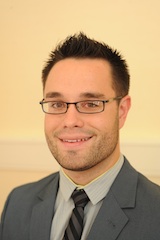Kevin Moch
Classics graduate student
Roman literature and culture; the epic tradition; elegy; intertextuality; Indo-European linguistics; etymology
A.B. Princeton University 2010
Selected publications
Undergraduate thesis (awarded departmental John J. Keaney Prize by faculty):
Si Cives Huc Usque Licet: The Citizen and the Individual in Lucan's Bellum Civile
Personal statement
I am currently a second year student in the Classics program here at Berkeley. I received my undergraduate degree in Classics, with a certificate in Linguistics, from Princeton in 2010 (summa cum laude, Phi Beta Kappa). I am set to receive my M.A. in Classics (Greek) from Berkeley in May 2013.
While my main research interests lie in the poetry of the Augustan Age (especially that of Ovid, Propertius, and Vergil) and the cultural and literary contexts in which it was produced, I am broadly interested in Greek and Roman literature, history, and culture from the Archaic period until the late second century A.D. In my studies at Berkeley thus far, I have completed significant projects on topics as wide-ranging as the changing depictions of gigantomachy on Archaic red- and black-figure pottery; the role and significance of fama in Ovid's Metamorphoses; the existence or non-existence of the concept of a soul in Homeric epic; the potential influence of Caesar's De Bello Civili on Lucan's Bellum Civile; semantic shift in Indo-European color terminology; and the eccentric nature of the cure tablets from the sanctuary of Asclepius at Epidaurus.
While I can easily imagine my future research interests continuing in the direction of epic (especially Homer, Vergil, Ovid, and Lucan), elegy (in particular, Propertius and Tibullus), and into other areas of Latin and Greek literature, I hope to dip my toes further into the pools of historiography, linguistics, gender and sexuality, and literary and textual criticism. Eventually, I hope to work more broadly on the effects on Augustan literature of cultural changes in the transition from Republic to Empire, as well as the interplay of literature and authority in antiquity. In simplest terms, I am fascinated by language and the power it has both to reveal and conceal, to affect and effect, to stunt and to stop; how it changes (itself), how it changes us, and how we change it, consciously or not. This, I believe, is the kernel from which many of my interests grow.


